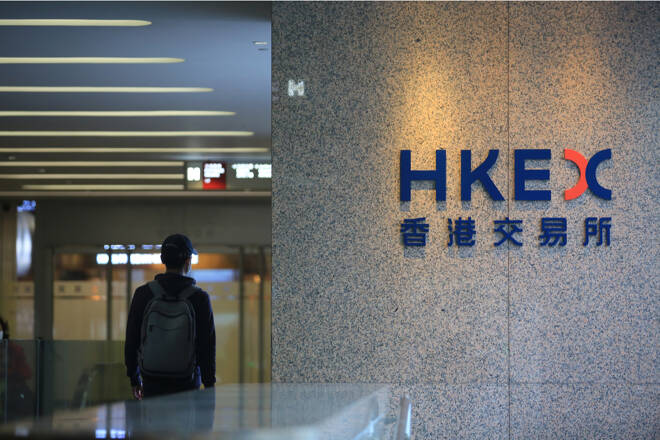Advertisement
Advertisement
Hang Seng Index and Mainland China Stocks Rally Despite China’s Weak PMIs
By:
Key Points:
- Chinese policy measures lift mainland markets: CSI 300 surges 4.24%, and Shanghai Composite jumps 3.55% despite weak PMIs.
- Hang Seng gains 1.28% as China’s fresh stimulus offsets weak PMI data, fueling a rally in tech and property stocks.
- Nikkei 225 tumbles 4.67% as fears of BoJ rate hikes intensify as investors await comments from Japan’s incoming Prime Minister.
US Equity Markets End Friday Mixed
On Friday, September 27, the US equity markets had a mixed session. The Dow gained 0.60%, while the Nasdaq Composite Index and the S&P 500 saw losses of 0.39% and 0.13%, respectively.
US Personal Income and Outlays Report Sends Mixed Signals
On Friday, the US Personal Income and Outlays Report supported bets on a 50-basis point November Fed rate cut. The PCE Price Index increased by 2.2% year-on-year in August, down from 2.5% in July. However, weaker-than-expected personal income and spending figures signaled a weaker demand outlook, possibly impacting the US economy.
Expert Views on US Inflation and the Fed
Arch Capital Chief Global Economist Parker Ross commented on Friday’s report:
“Altogether, this morning’s PCE inflation report should give the Fed further comfort about inflation durably returning to target, with few hints of any potential widespread reacceleration.”
Japan’s Incoming Prime Minister Rattles Markets
On September 27, the USD/JPY tumbled 1.83%, closing at 142.154. News of Shigeru Ishiba winning the leadership election drove buyer demand for the Japanese Yen. Ishiba’s calls for the Bank of Japan to progress toward monetary policy normalization impacted buyer demand for Nikkei-listed stocks.
Retail sales figures from Japan also fueled speculation about a Q4 2024 BoJ rate hike. Retail sales increased by 2.8% year-on-year in August, up from 2.7% in July. Upward trends in consumer spending could fuel demand-driven inflation, possibly supporting a more hawkish BoJ rate path.
China’s Economic Stimulus Counters Disappointing PMIs
On Sunday, CN Wire shared news of the PBoC planning to cut mortgage rates for first and second homes by about 50 basis points. All commercial banks must reportedly lower all existing mortgage rates by October 31 to no less than 30 basis points below the PBoC’s Loan Prime Rate.
China’s policy measures to bolster its economy countered disappointing private sector PMI numbers. The influential Caixin Manufacturing PMI dropped from 50.4 in August to 49.3 in September, signaling a contraction.
Hang Seng Index and Mainland China Markets Rally
On Monday, the Hang Seng Index advanced by 1.28%. News of stimulus measures from the weekend fueled gains across HK and Mainland China-listed stocks.
The Hang Seng Mainland Properties Index (HMPI) surged by 6.26% in response to the weekend news on mortgage rate cuts. Tech stocks also extended their gains from Friday, with the Hang Seng Tech Index (HSTECH) gaining 3.75%.
Alibaba (9988) and Baidu (9888) rallied 4.68% and 2.98%, respectively, while Tencent (0700) gained 0.11%.
From mainland China, the CSI 300 jumped by 4.24%, with the Shanghai Composite rallying 3.55%.
Nikkei Index Slides on Fears of BoJ Rate Hikes
In contrast, the Nikkei 225 tumbled 4.67% on Monday morning over concerns that political pressure could push the BoJ to continue raising interest rates.
Tokyo Electron (8035) slumped by 7.48%, while Softbank Group Corp. (9984) slid by 6.82%. Nissan Motor Corp. (7201) declined by 5.49%.
ASX 200 Edges Higher on Mining and Oil Stock Gains
Meanwhile, the ASX 200 Index advanced by 0.32% on Monday. Mining and oil stocks contributed to the gains.
Mining stocks BHP Group Ltd. (BHP) and Rio Tinto (Ltd) saw gains of 1.99% and 2.53%, respectively, while Fortescue Metals Group (FMG) rallied 3.13%. Iron ore price gains, following China’s new policy measures, drove demand for mining stocks.
Woodside Energy Group Ltd. (WDS) advanced by 2.94% on Monday. Concerns over supply disruption stemming from the Middle East conflict pushed crude oil prices higher.
With the focus remaining on the central banks and stimulus news from Beijing, investors should stay alert and closely monitor news wires, real-time data, and expert commentary to adjust trading strategies accordingly. Stay informed with our latest news and analysis to manage positions across the Asian equity markets.
About the Author
Bob Masonauthor
With over 28 years of experience in the financial industry, Bob has worked with various global rating agencies and multinational banks. Currently he is covering currencies, commodities, alternative asset classes and global equities, focusing mostly on European and Asian markets.
Advertisement
